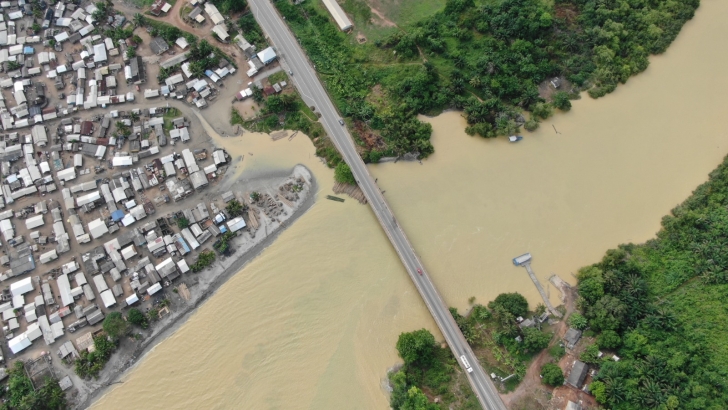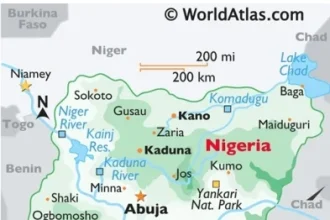Where are we now?
Illegal gold mining (known as Galamsey) in Ghana has now escalated into a national crisis, inflicting many societal challenges and causing severe biodiversity destruction and health issues. The contamination of the country’s main rivers has reached a critical level.
Household tap water is turning brown, and river bodies are muddy and yellow, posing the risk of Ghana importing water by 2030.
The surge in congenital disabilities among newborns and infants, including kidney problems within mining communities, is a tragic consequence, a stark reminder of the human cost of this crisis.
Besides, national forest reserves and cocoa plantations are being destroyed, with farmers forced to sell their cocoa plantations to illegal miners due to poverty and lack of government support. The massive destruction of the country’s forest reserves has sparked a national outcry from the public, the media, labour unions, and religious groups, demanding to #STOP GALAMSEY NOW!
Given these myriad societal challenges, it is imperative to question whether Ghana is at risk of becoming a failed state in addressing this long-standing societal issue, which has persisted for decades across the two leading political administrations since Ghana’s fourth republic democratic governance.
The urgency of this situation cannot be overstated. However, the lack of regulatory, coherent sustainability policies and political will from the Executive, Legislative, and Judiciary powers makes one wonder whether it makes sense now to declare a state of emergency in response to the Galamsey crisis.
Of course, the government has a crucial role and moral obligation to urgently address this widespread crisis, especially in managing the complexities of people, profit, and environmental concerns in small-scale gold mining.
What is being done?
From a political and sustainability policy perspective, the attempts to regulate and operate illegal small-scale mining (Galamsey) have been a series of failures, primarily due to a lack of clear policy guidelines, political will, greed and corruption.
Case in point, the temporary ban on small-scale mining in 2017, the confiscation and burning of numerous excavators, and the formation of a joint task force involving military and other security personnel, which led to the deportation of thousands of Chinese miners, all fell short in addressing the systemic sustainability issues of illegal gold mining.
Now, as Ghana’s presidential and parliamentary elections loom on December 7, 2024, there are increasing calls from political leaders, media, and academics for a ‘shoot and kill’ approach to ending illegal mining, as well as suggestions of life imprisonment for illegal miners.
At the same time, mining licenses are being continued to be issued. The recent developments raise questions about whether these decisions effectively address the conflicting sustainability issues of natural resources management, biodiversity protection, and tackling youth unemployment and poverty.
It is crucial to assess how these decisions align with Ghana’s climate action and the UN Sustainable Development Goals for 2030 and ensure that they meet the needs of both current and future generations. Indeed, political feasibility concerns are significant in Ghana’s Galamsey policymaking.
However, these concerns are often disregarded when evaluating the impact of policies and decision-making on society and environmental sustainability.
What can be done? Understanding from the Political Feasibility Perspective.
Yes, the necessity of novel and effective regulations could provide a glimmer of hope for change, reminding us of the significance of sustainable development and climate action in our policy decisions. However, until Ghana’s politics address the political feasibility of bridging the gap between desirable and possible, no meaningful change will occur now or in the future. This leads to the question: Can local chiefs, national government authorities, and the executive branch who are keen on maintaining political power and their financial gains contemplate the prohibition of illegal mining or the enforcement of strict regulations for responsible small-scale mining operations, which might affect their economic interests, including those that finance or support political parties?
Given this, it is crucial to develop various scenario policy options to tackle Galamsey and the challenges mining communities face, including poverty, hunger, greed, crime, corruption, lack of responsible mining measures, weak regulatory frameworks, and unemployment.
Understanding the interconnected relationships, synergies, and potential conflicts among stakeholders is necessary to develop effective sustainability policies. This requires identifying the actors, their beliefs, motivations, resources, and interaction points.
i) This understanding can help promote dialogue, establish win-win and win-lose situations, and foster collaboration across sectors and decision-makers, including leveraging international partnerships.
ii) Achieving this will require strong leadership, moral obligation, political commitment, effective regulations, monitoring measures, and investments in the small-scale mining sector.
iii) Additionally, it will require active citizen participation, for example, in land reclamation and restoration efforts and the promotion of ‘responsible mining’ in the future, fostering the conversation to ‘reimagine what responsible mining could entail in the small-scale mining sector’.
Bringing it all together
In order to address the increasing Galamsey crisis, it is crucial to develop solutions that consider cultural, legal, economic, technological, political, environmental, and social factors. These solutions should be pursued through interdisciplinary, bottom-up, and collaborative approaches.
There are already concerns that strict enforcement of laws against illegal mining could negatively impact a ruling political party’s electoral prospects. This means that citizens, including voters, must now influence the political and policy landscape to address the Galamsey crisis, as policies with solid political support are more likely to succeed!
The writer is an Associate Professor in Responsible Business & Sustainability at the University of Birmingham, UK | Founder: Centre for Sustainability & Social Inclusion, GH.
















